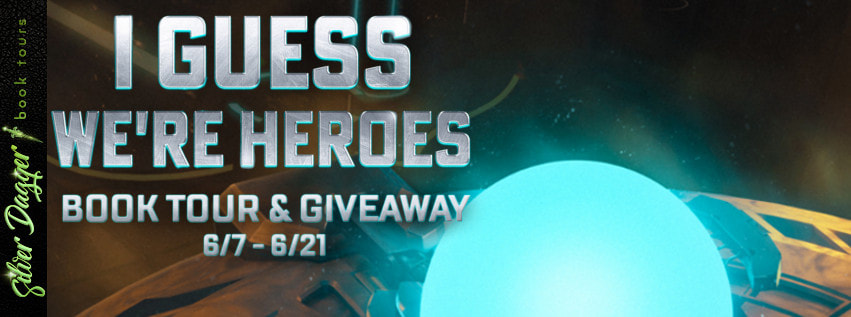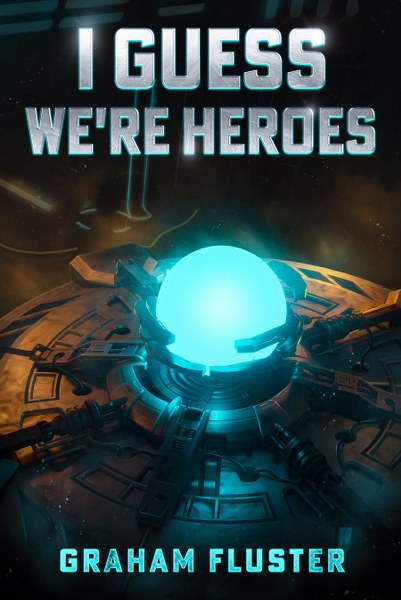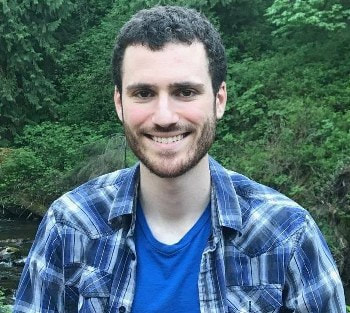Alice struggled to pay attention to her work while Jamie swept his camera around the Galactic Exploration Corporation’s brand new scillicite lab. When left to her usual workflow, Alice was completely at home with the supercomputers, experimental sensors, and vast assortment of electronic parts for custom-crafting new tools; with Jamie filming over her shoulder, however, she was keenly aware of every movement and facial expression being immortalized on the memory card. Even when the camera was pointed at Gideon and Ryota, she still felt rigid from the thought that it could turn back to her at any moment.
The obnoxiously cheerful marketing manager normally wouldn’t film projects himself, but Jamie had wanted to be directly involved for the debut of the Scillicite Proximity Detector’s first prototype. Once he had enough footage of them working individually, Jamie backed up for a shot of all three scientists conducting their final safety checks. Finished with his wide shot, he focused in on Alice to start the introduction. “Care to walk me through what you’re doing?”
“Not particularly,” she responded flatly, pushing the camera away from her with one hand as she continued typing on her laptop with the other. “My notes on the SPD are all on the server. Read as much as you like.”
“You won’t get more money from the board of directors without a little showmanship, Dr. Turner; I need you to help me make this project pop!” Jamie said. Before hiring the three physicists, the Galactic Exploration Corporation had been entirely focused on engineering spaceships from known and proven concepts, and Jamie had worked for GEC long enough to know that a showy debut would be necessary to keep the new research wing of the company alive.
“You people in marketing making things ‘pop’ is GEC’s problem,” Alice grumbled. “‘Galactic’ is such a presumptuous title for a company that hasn’t even left the solar system yet. Half of our ships just fly rich tourists in low orbit around Terra, and the ones capable of leaving our planet’s gravity well only go as far as the asteroid belt.”
“You have to walk before you can run,” Jamie said. “Besides, the asteroid mining industry is the first step in exploring past—”
“I’ll handle the introduction,” Gideon said, gesturing for the camera to be turned towards him. Being the son of the company’s CEO, Gideon figured it was his right to be the face of the research team. “I’m Dr. Gideon Wright, and these are my colleagues Dr. Alice Turner and Dr. Ryota Saito. Here we have our latest prototype of the Scillicite Proximity Detector, a device that will greatly reduce the difficulty of locating new sources of scillicite and bring in an obscene profit from selling our surplus to the highest bidder.”
“Money is the least interesting thing here,” Ryota chimed in, turning away from his computer. “If we’re successful, the additional scillicite will accelerate new discoveries that break the laws of physics and improve people’s lives.”
“It’s not ‘breaking’ physics,” Alice said, sufficiently annoyed by Ryota’s oversimplification to end her boycott of Jamie’s camera. “Scillicite allows us to interact with the world like any other tool, but in a much more powerful way. It only looks like it’s ‘breaking’ the rules because we have an incomplete understanding of them.”
“Would you elaborate a little further?” Jamie prompted, happy that he finally had the whole lab involved.
Alice sighed, and continued working on the initialization checks as she spoke. “Imagine you lived on a tropical island with no mountains before the invention of the freezer. Since the temperature never goes below freezing naturally, you never would have seen water turn to ice. As far as you know, water can never be a solid, it’s only ever a liquid or a gas. Then, one of your friends invents a freezer, and you see water become a solid. The freezer hasn’t ‘broken’ the physics of water, it’s simply a tool that gave you access to a different set of rules that you didn’t know existed before.”
“And with those new rules, we can do a lot more than we could with our previous toolkits,” Ryota said, taking over before Alice said something rude to the camera again. “In the three years since asteroid miners first brought scillicite to Terra, multiple labs have independently confirmed its use in many applications, including changing the strength of molecular bonds in a steel plate, causing heat to flow from cold to hot in a copper wire, and here at GEC’s scillicite lab we made a wormhole!”
“What sort of impact would those changes make to the technology we use?” Jamie asked.
“All sorts of things,” Ryota continued. “Stronger steel would allow a crane to lift a heavier payload without bending, keeping wires cold would let a computer operate continuously at full power without worry of frying its circuits, and of course wormholes are the holy grail of travel technology!”
“But those experiments have yet to be engineered into any marketable products,” Gideon said, eager to have the camera back on him. “The change in the strength of the steel plate and the reversed heat flow in the copper were barely measurable, and the wormhole only moved a single atom across a few centimeters of space before collapsing. The real prize is controlling the supply of new scillicite while everyone else scrambles to figure out how to best use it, and that’s exactly what the SPD will capitalize on. GEC’s early dominance in the asteroid mining industry has resulted in us owning 85% of Terra’s stockpile of scillicite, and that number will grow even higher when the SPD boosts the efficiency of our mining ships.” Gideon assumed that GEC would sell most of its surplus to their own government, given that Phevra’s defense budget was far greater than any other nation on Terra, but he decided to leave speculations of GEC joining the military-industrial complex to the executives’ greedy imaginations.
Excerpt 2
“What about you?” Kell asked, leaning in close to Mei. “Did you take my stim pen?”
“I don’t use stims, I sleep like a normal person,” Mei said, turning her head away from Kell’s bad breath and taking a step back.
“Well then where is it?!” Kell screamed.
“I took it,” Julia said, walking up to the rest of the group and stopping a few meters away. “And I destroyed it, because it made you nearly kill our prisoner.”
“I don’t need peptrothol to kill,” Kell said as he reached for his pistols, but he barely had them out of their holsters before Julia had her pistol drawn and pointed at his head.
“Everyone calm down,” Bernard said. “We’re standing next to several tons of high explosives, if one of you misses it could kill us all. It’s a miracle these things didn’t blow up when we took the hangar.” Mei knew that the warheads were highly unlikely to be set off by a bullet, let alone one with as little power as those fired from a handgun, but she saw no need to bring that up; if Bernard could prevent a fight with a misconception, why get in the way?
“I can work with that,” Kell said, pretending like Bernard’s warning was the reason he put his guns away, and not the fact that he had been too slow on the draw. He took out his oversized combat knife and twirled it around a few times. “Shall we?”
“What?” Bernard said. “No, that’s not what I—”
“If you insist,” Julia said, holstering her pistol and deploying her bayonet.
Julia took a defensive stance and studied her opponent; he was fighting for pride, not any tactical objective, so if she could hurt him badly enough to make fear replace his anger, she could quell his revolt without killing him. Kell rushed towards her and opened with a feint slash at her face, then made a sweeping kick at her knee. Julia brought her bayonet up to parry the knife and stepped back to dodge the kick. As his leg passed her, she brought her blade down and slashed open the back of his calf. Kell gritted his teeth at the pain, unable to shrug it off as easily as he normally did with the help of his stims.
“Beginner’s luck,” Kell snarled, and charged again. This time he threw one of his smaller knives as a distraction while he stabbed his main knife towards the gap between the breastplate and shoulder plate of Julia’s armor. She was too slow to dodge the thrown knife completely, and received a deep cut on her cheek as she sidestepped it, but she recovered her balance before Kell could stab her. She grabbed the wrist of the arm holding the large knife and swung Kell around so the momentum of his charge slammed him face first into one of the cargo crates.
“Had enough yet?” Julia asked. She was doing well so far, but even with Kell’s reflexes slowed from his withdrawal, it was still difficult for her to stay out of reach of his knives, and she figured that provoking him would make him sloppier.
“I’ll have had enough when your guts are covering the deck!” Kell shouted, blood streaming down his face from his broken nose. He drew another knife with his left hand and charged again, this time stabbing with both weapons, one at the gap in the armor at the shoulder joint and the other at Julia’s waist just beneath the breastplate. Julia tried to parry the attack from her left with her armored forearm and the one from her right with her bayonet, but only had limited success; she stopped the smaller knife, but the larger one dug into her elbow just past the forearm plate.
Deciding she had learned enough of his fighting style to not focus primarily on defense, Julia pivoted to go on the attack. Her left arm was slower after the hit to the elbow, so she kept that side of her body turned away from Kell and slashed repeatedly with her prosthetic right arm. Kell parried and dodged several strikes, using his larger knife for defense, and landed a few hits on Julia’s right arm with his smaller knife, but the blade did little more than scratch the surface of the metal limb.
Once Kell’s focus was entirely on her right arm, she brought the left back into play and caught his wrist again as he repeated his tactic of blocking with the large knife and stabbing with the small one. Before he could twist free, Julia impaled his forearm from the unarmored inner side and slashed upwards towards the elbow, then released him and took a quick step back to evade a potential counter attack. Blood gushed from the massive wound as Kell collapsed to the ground screaming, doing what little he could to apply pressure and slow his demise.
Excerpt 3
The view screen automatically dimmed as the Warthog’s PDCs prematurely detonated three incoming missiles. Moments later they would feel the vibrations of the shrapnel hitting them, but that was a small danger. The Warthog’s defensive systems diverted power to the Aug, fortifying the hull against the impending impacts, and the shredded husks of the former missiles clattered off of the Warthog harmlessly.
The persistence of these pirates bothered Diego. He could understand attacking their freighter when the only visible weapon was the railgun along the top of the ship, but now that the Warthog had deployed its PDC and missile pods, it was a much more threatening target. The Warthog was still at a disadvantage, but did the pirates really think their cargo was valuable enough to take on a fight like this?
Harris burst into the cockpit, his rapid, shallow breaths fogging up his faceplate faster than his suit’s environmental systems could clear it. “Get us out of here, Diego! Why haven’t we jumped away?”
“Running is no use while their sensor array is operational,” Diego said. “They could easily scan the residue of our outbound wormhole and jump after us. We’re already at a power deficit from the initial jump, and doing another would just make it worse.”
Harris stumbled as Diego lurched the Warthog to the side. The pirates were only 200km away now, and their railgun darts were getting harder to dodge. Even with the inertial dampening field coddling them, the crew was subjected to enough force from the evasive maneuvers that standing up was a questionable idea at best. “Strap in somewhere Harris, they’re about to pass us at close range.” Harris barely had time to secure himself before the pirates sped past the Warthog, with only 1km between the two ships at the closest point.
The exchange of fire at point blank range was brutal. Railgun darts flew across the gap at 100km/s, impossible to avoid. Missiles blazed across the minimal distance, getting the better of both ships’ potent but overburdened PDCs. The Warthog’s crew braced against whiplash as the onslaught pummeled their ship; as much of the Warthog’s power output as possible was being used to fortify the hull, with the bare minimum being used on inertial dampening to keep the acceleration from being fatal.
Diego quickly recovered from the moderate head trauma and looked at the damage report on his display. All of the port PDCs and one of the missile batteries had been destroyed, and the other missile battery was out of ammo. The railgun on top of the Warthog was salvageable, but had been too badly damaged to fire without repairs. The starboard PDCs were in perfect condition since that side of the ship had been facing away during the pass, but the power cables leading to the rotary motors had been severed by shrapnel, leaving the guns stuck pointing wherever they had been when they lost power. The Warthog’s remaining assets were a breached hull, a mildly damaged sensor array, an undamaged reserve air tank, and a 29% charge in its capacitors.
A quick scan of the enemy ship showed they had lost as many weapons as the Warthog, but they had started the fight with more to lose. Diego got a glimpse of hope, however, when he saw that the pirate’s sensor array had been heavily damaged. “Full power to engines, H8. If we can get out of their reduced sensor range, we might have a chance.”
The Warthog capitalized on its head start by fleeing at its full acceleration of 3gs in the opposite direction that the pirates had passed them at 10km/s. The pirates quickly flipped their ship around and began their 5g burn back towards the Warthog, but it would take them several minutes to overcome their initial velocity. Every 30 seconds Diego made small course changes to see if the pirates changed to match them, checking if they were still in their sensor range.
A few minutes later the pirates had managed to match speed with the Warthog and were still mirroring every course change. Now that the head start had been spent, that distance would only shrink as the pirates’ superior engines closed the gap. Diego cut the engines, transferring the reactor’s output back to charging the capacitors.
“If you haven’t already, grab a gun,” Diego said to Harris before he and H8 unbuckled their harnesses and stood up.
“What are you doing?” Harris yelled, staring wide-eyed at the empty seats Diego and H8 left behind, then standing to follow them to the weapons locker in the common room. “Who’s going to fly the ship?”
“They haven’t been shooting at us since that first pass,” Diego said. “They know they’ve knocked out our guns, so now they’re going to board us to take the ship.”
“You should be excited, Harris; this is the best part!” H8 said, loading the rifle he had just taken from the weapons locker. “Diego, Julia, and I were in a pinch just like this back when I first joined ISC, and it was the most fun I’ve ever had!”
My interest in writing began with tabletop roleplaying games, with my favorites being Dungeons & Dragons, D20 Future, and GURPS. I loved creating vast and detailed worlds for the player characters to interact with, and coming up with contingencies for whatever direction their actions steered the plot. While I usually enjoyed the chaotic nature of the TTRPG format, I sometimes felt a little boxed in with what kinds of stories I could tell, since I only had a loose influence over the actions of the main characters. Shortly after noticing that sentiment, I saw a Reddit post along the lines of, “wouldn’t it be fun to write a D&D campaign where you controlled all of the characters?” with the top comment being: “wouldn’t that just be writing a book?” After briefly feeling stupid for not coming to that conclusion on my own, I started mapping out my more detailed ideas in novel format, and leaving the more open-ended ones for my TTRPG campaigns.
I grew up in Pullman, a small college town on the eastern side of Washington (the state, not the capital city). I moved to Seattle in 2011 to study physics at UW, and have lived here ever since.
I usually prefer either single player RPGs like the Fallout series, or casual multiplayer games like Quiplash. Sometimes I’ll play something competitive online like Starcraft or Overwatch, but that can become stressful if a teammate gets mad at you for “bringing down the team,” even though they’re just as bad. Like, come on buddy, if you were any good at the game, you wouldn’t be ranked low enough for the algorithm to put you on a team with me; we’re all trash down here in bronze league!









Comments
Post a Comment